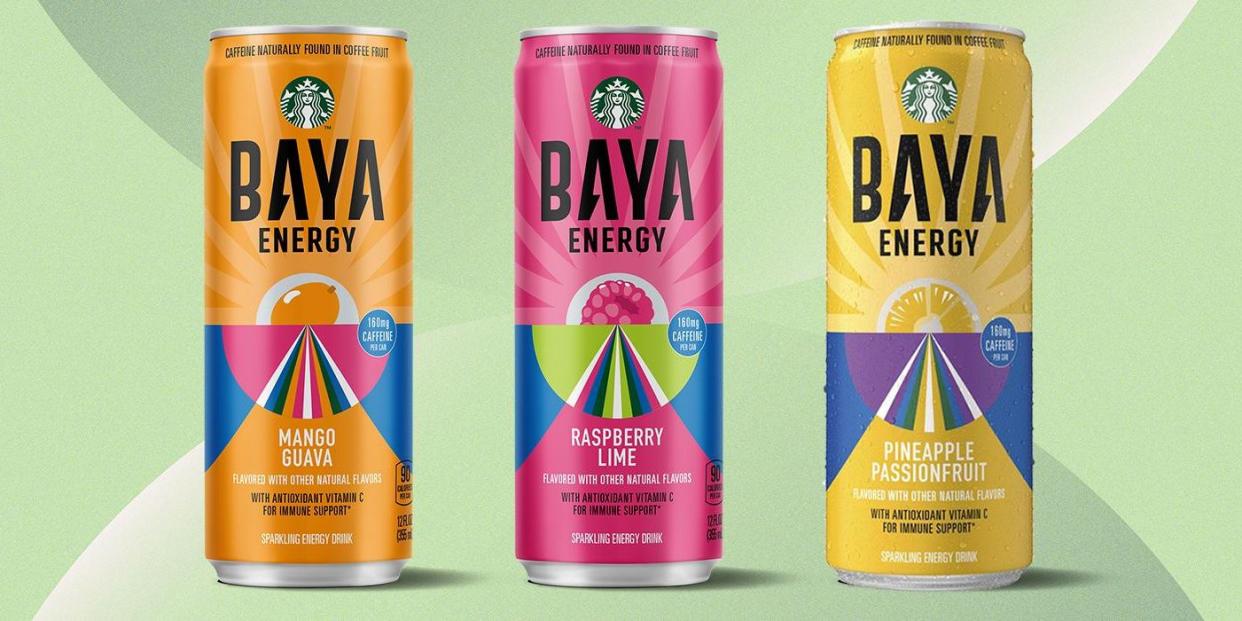Can Starbucks’ BAYA Energy Drink Make You Healthier?

Big news for Starbucks fans: The company just launched a new canned energy drink called BAYA Energy.
The drink, which is in grocery stores now, is made from caffeine that’s naturally found in coffee fruit and includes vitamin C, which Starbucks says on the label is “for immune support.” Right now, BAYA is available in three flavors: Mango Guava, Raspberry Lime, and Pineapple Passionfruit.
BAYA is Starbucks’ first-ever energy drink, and the company seems to be targeting people who want more natural ways of feeling pepped up (the words “natural” and “naturally” both appear on the front label). But is BAYA healthy? Here’s what you need to know.
What’s in Starbucks’ BAYA Energy?
Each flavor of BAYA has slightly different ingredients. Here's a breakdown:
Starbucks Mango Guava BAYA Energy
Carbonated water, white grape juice from concentrate, cane sugar, mango juice from concentrate, natural flavors, beta carotene, ascorbic acid (vitamin C), coffee fruit extract, green coffee bean extract, citric acid
Starbucks Raspberry Lime BAYA Energy
Carbonated water, white grape juice from concentrate, cane sugar, lemon juice from concentrate, raspberry juice from concentrate, lime juice from concentrate, natural flavors, beta carotene, ascorbic acid (vitamin C), coffee fruit extract, green coffee bean extract, lycopene
Starbucks Pineapple Passionfruit BAYA Energy
Carbonated water, white grape juice from concentrate, cane sugar, pineapple juice from concentrate, natural flavors, ascorbic acid (vitamin C), beta carotene, citric acid, coffee fruit extract, green coffee bean extract
Starbucks BAYA Energy nutrition
Nutrition varies slightly with each BAYA Energy drink. This is what you can expect nutrition-wise from each 12-ounce can:
Starbucks Mango Guava BAYA Energy
Calories: 90
Fat: 0 grams
Sodium: 10 milligrams
Carbohydrates: 23 grams
Total sugar: 23 grams
Added sugar: 17 grams
Protein: 0 grams
Calcium: 4 milligrams
Potassium: 17 milligrams
Vitamin C: 90 milligrams
Caffeine: 160 milligrams
Starbucks Raspberry Lime BAYA Energy
Calories: 90
Fat: 0 grams
Sodium: 0 milligrams
Carbohydrates: 23 grams
Total sugar: 22 grams
Added sugar: 16 grams
Protein: 0 grams
Calcium: 5 milligrams
Potassium: 24 milligrams
Vitamin C: 90 milligrams
Caffeine: 160 milligrams
Starbucks Pineapple Passionfruit BAYA Energy
Calories: 90
Fat: 0 grams
Sodium: 0 milligrams
Carbohydrates: 23 grams
Total sugar: 22 grams
Added sugar: 17 grams
Protein: 0 grams
Calcium: 4 milligrams
Potassium: 22 milligrams
Vitamin C: 90 milligrams
Caffeine: 160 milligrams
Is Starbucks’ BAYA Energy healthy?
It’s important to point out upfront that Starbucks never claims that its BAYA Energy drinks are healthy. But the label definitely says that the drinks include the “antioxidant vitamin C for immune support.” Having a good, healthy immune system is clearly important now that we’re entering year three of a global pandemic, but what does this mean, exactly? Can an energy drink make your immune system stronger?
“Vitamin C is known to be an antioxidant and it also works as a cofactor for many enzymes in the immune response,” explains Jamie Alan, Ph.D., associate professor of pharmacology and toxicology at Michigan State University. “That means that it does make the immune system work ‘better.’”
Recommend dietary allowances of vitamin C vary depending on your age and whether you’re male or female, but it’s generally recommended that men over the age of 18 have 90 milligrams of vitamin C a day and that women strive for 75 milligrams of vitamin C a day. (For women who are pregnant and breastfeeding, those amounts increase to 85 milligrams and 120 milligrams, respectively.)
But, while hitting your recommended daily vitamin C intake is important for keeping your immune system running efficiently, Alan says that “taking an extra-large dose does not do much extra because your body will eliminate the extra vitamin C in the urine.” Basically, you'll end up peeing out whatever your body doesn’t use.
If you were already planning to have a Starbucks BAYA Energy drink, it could help ensure that you’re hitting the amount of vitamin C that you need for the day. But, Alan points out, “an orange or a vitamin C tablet is probably much cheaper.”
Overall, nutritionists say BAYA shouldn’t be viewed as a health drink. “Because of its high sugar content, this is still best consumed in moderation,” says Jessica Cording, R.D., C.D.N., author of The Little Book of Game-Changers. BAYA doesn’t have protein or fat to buffer the breakdown of that sugar you’re drinking, she points out. As a result, “drinking this could make you more prone to blood sugar spikes and crashes, and when combined with caffeine, that energy roller coaster effect could feel more pronounced,” Cording says.
But Keri Gans, R.D., C.D.N., author of The Small Change Diet, says the drink is somewhat “neutral” in the health department. “Seventeen grams of added sugar could be considered high for a single serving. However, compared to other Starbucks drinks, it is actually on the lower end,” she says.
Gina Keatley, a C.D.N. practicing in New York City, agrees. “It’s not healthy but it’s not not healthy either,” she says. “Consuming caffeine may increase mood and metabolism—briefly—but can also make you feel anxious and give you an upset stomach. The calories are mostly added sugar, with no fiber.”
Still, Gans says this is worth considering if you’re on the hunt for a coffee or tea alternative. “If you are looking for a caffeine boost without a lot of calories, this drink might be the one for you, especially if you don’t like coffee or tea,” she says. Think of the vitamin C as an added bonus.
You Might Also Like

